Garlic, a member of the Liliaceae family, is a plant whose history has long since been forgotten. The first remarks were made in ancient Egypt about 3000 BC. In reality, to boost power and maintain health, garlic was a staple of the daily diet, particularly for pyramid builders. Few people are aware that garlic’s powerful antibacterial and antiseptic capabilities boost a number of healthy qualities.
The entire advantages should be consumed raw and on an empty stomach in order to provide the most yield, particularly in certain circumstances. When you fast, the benefits of garlic to execute an antibiotic activity are at most minimal since fasting may actually lower its qualities. Garlic improves blood pressure and circulation while lowering cholesterol, blood sugar, and cardiovascular disease.

It promotes healthy digestion, combats motion sickness, and flawlessly protects the liver and bladder from damage. Garlic is advised in cases of diarrhoea because it helps an appropriate enteric bacterial flora grow. Since it makes it easier for living things to produce serotonin, popularly known as the hormone of happiness, it also affects mood, showing to be effective for managing stress and anxiety.
As was previously noted, allicin, an important element in garlic, is an antibiotic with natural origins that may defeat bacteria, viruses, fungus, parasites, worms, and toxins while promoting health and cleansing. It fortifies the immune system to ward against seasonal illnesses including colds, the flu, coughs, and disorders of the respiratory tract. As if that weren’t enough, garlic’s antioxidant properties enable it to inhibit the activity of free radicals, which slows down cell ageing. A Chinese research found that eating raw garlic twice a week significantly lowers the chance of developing lung cancer.
Additionally, it indicates that its intestine-strengthening and protective effects assist in lowering the risk of bowel cancer. Finally, we advise you not to consume excessive amounts of garlic in order to prevent chafing of the intestinal walls. In the event of gastritis, a peptic ulcer, or anaemia, it should be avoided. It is beneficial to be aware that various people may be allergic to it and that it may hurt when taken with certain drugs, such as anticoagulants.